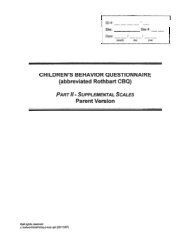A Contextual Investigation of Three-Digit Addition and Subtraction
A Contextual Investigation of Three-Digit Addition and Subtraction
A Contextual Investigation of Three-Digit Addition and Subtraction
You also want an ePaper? Increase the reach of your titles
YUMPU automatically turns print PDFs into web optimized ePapers that Google loves.
150 THE TEACHING AND LEARNING OF ALGORITHMS IN SCHOOL MATHEMATICS<br />
nificant because the students were able to reorganize their beliefs about doing mathematics<br />
in this setting. This change in beliefs could be characterized, using Skemp’s<br />
(1976) distinction, as shifting from instrumental views toward more relational views <strong>of</strong><br />
doing mathematics. A comparison <strong>of</strong> interviews conducted with the students before <strong>and</strong><br />
after the classroom teaching indicated that they had all made significant progress in<br />
their numerical reasoning (Bowers 1996).<br />
The episodes discussed in this paper provide support for a change in emphasis “toward<br />
conjecturing, inventing, <strong>and</strong> problem solving-away from an emphasis on mechanistic<br />
answer-finding” (NCTM 1991, p. 3). This emphasis should in no way be construed<br />
to mean that students do not need to construct powerful algorithms; it simply<br />
calls attention to the importance <strong>of</strong> students’ developing increasingly sophisticated numerical<br />
underst<strong>and</strong>ings as they develop personally meaningful algorithms. We have<br />
illustrated one attempt to achieve this goal that emphasizes the teacher’s proactive role,<br />
the contribution <strong>of</strong> carefully sequenced instructional activities, <strong>and</strong> the importance <strong>of</strong><br />
discussions in which students explain <strong>and</strong> justify their thinking.<br />
REFERENCES<br />
Bowers, Janet. “Children’s Emerging Conceptions <strong>of</strong> Place Value in a Technology-Enriched Classroom.”<br />
Doctoral diss. Peabody College <strong>of</strong> V<strong>and</strong>erbilt University, 1996.<br />
______. “Designing Computer Learning Environments Based on the Theory <strong>of</strong> Realistic Mathematics<br />
Education.” In Proceedings <strong>of</strong> the Nineteenth Conference <strong>of</strong> the International Group<br />
for the Psychology <strong>of</strong> Mathematics Education, edited by Luciano Miera <strong>and</strong> David Carraher,<br />
pp. 202-10. Recife, Brazil: Program Committee <strong>of</strong> the Nineteenth PME Conference, 1995.<br />
Cobb, Paul, Erna Yackel, <strong>and</strong> Terry Wood. “A Constructivist Alternative to the Representational<br />
View <strong>of</strong> Mind in Mathematics Education.” Journal for Research in Mathematics Education<br />
23 (January 1992): 2-33.<br />
Gravemeijer, Koeno. “Mediating between Concrete <strong>and</strong> Abstract.” In Learning <strong>and</strong> Teaching<br />
Mathematics: An International Perspective, edited by Terezinha Nunes <strong>and</strong> Peter Bryant, pp.<br />
315-45. Hove, Engl<strong>and</strong>: Psychology Press, 1997.<br />
National Council <strong>of</strong> Teachers <strong>of</strong> Mathematics. Curriculum <strong>and</strong> Evaluation St<strong>and</strong>ards for School<br />
Mathematics. Reston, Va.: National Council <strong>of</strong> Teachers <strong>of</strong> Mathematics, 1989.<br />
_______. Pr<strong>of</strong>essional St<strong>and</strong>ards for Teaching Mathematics. Reston, Va.: National Council <strong>of</strong><br />
Teachers <strong>of</strong> Mathematics, 1991.<br />
Skemp, Richard. “Relational Underst<strong>and</strong>ing <strong>and</strong> Instrumental Underst<strong>and</strong>ing.” Mathematics<br />
Teaching 77 (November 1978): 1-7.<br />
Yackel, Erna, Paul Cobb, Terry Wood, Grayson Wheatley, <strong>and</strong> Graceann Merkel. “The Importance<br />
<strong>of</strong> Social Interaction in Children’s Construction <strong>of</strong> Mathematical Knowledge.” In Teaching<br />
<strong>and</strong> Learning Mathematics in the 1990s, 1990 Yearbook <strong>of</strong> the National Council <strong>of</strong> Teachers<br />
<strong>of</strong> Mathematics, edited by Thomas J. Cooney, pp. 12-21. Reston, Va.: National Council <strong>of</strong><br />
Teachers <strong>of</strong> Mathematics, 1990.






